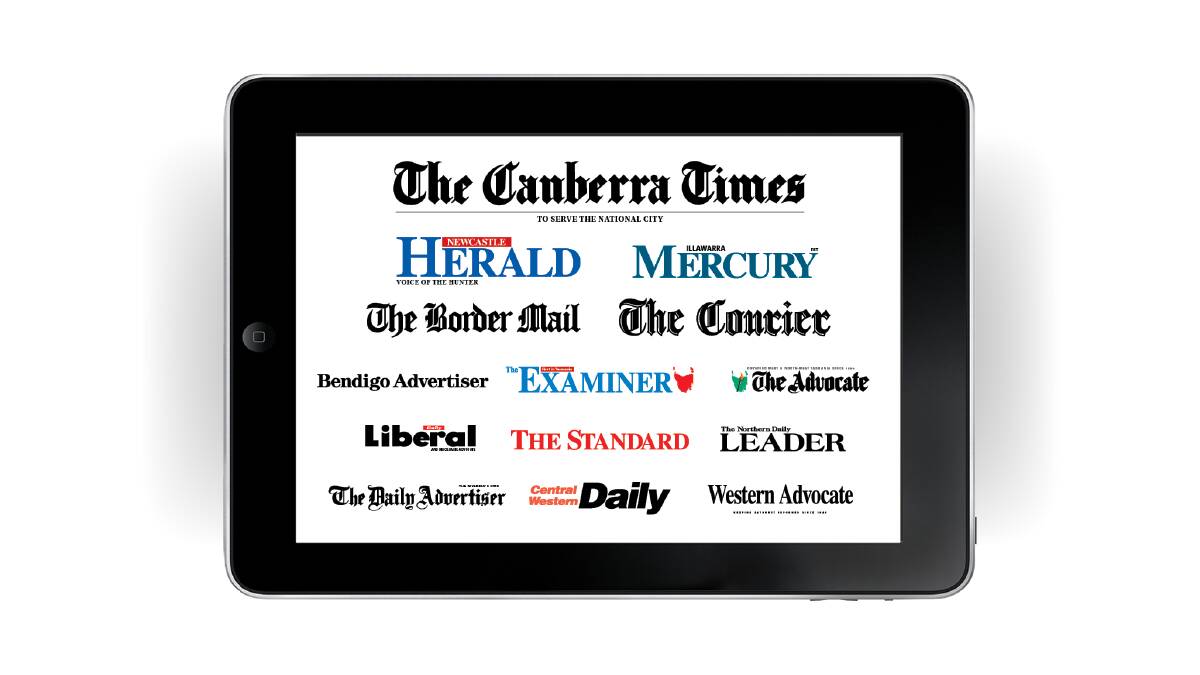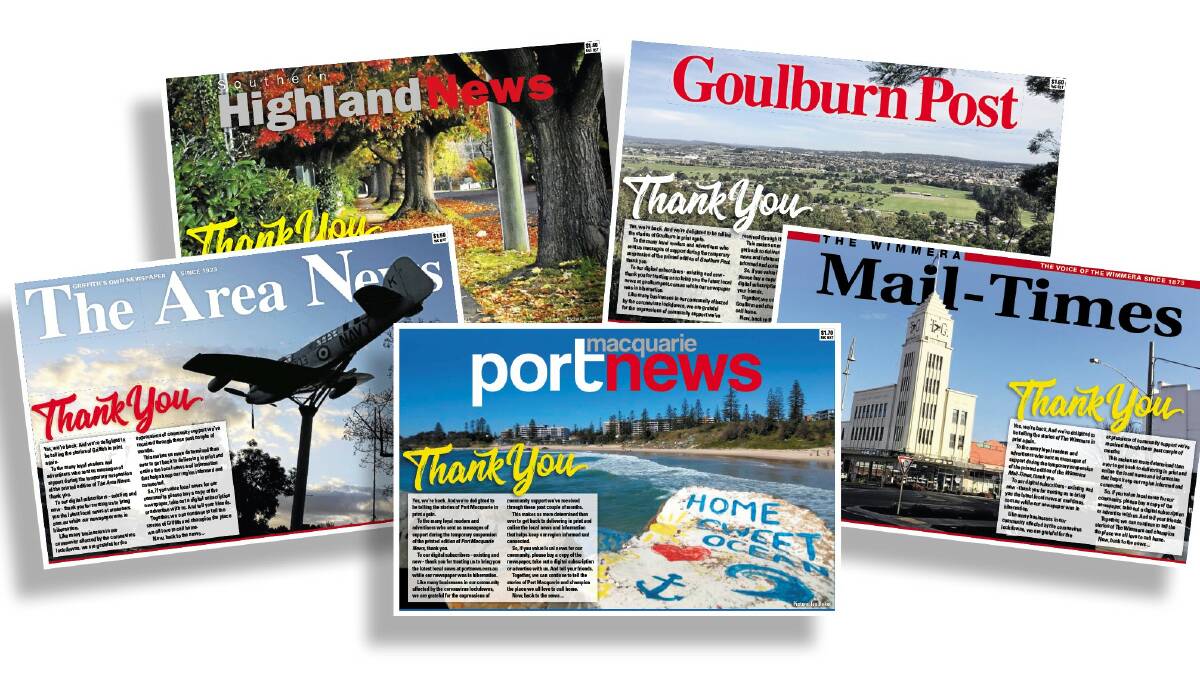
A massive increase in newsprint prices expected this year will threaten the viability of many Australian newspapers, publisher ACM has warned a federal parliamentary inquiry.
"It is perhaps the single biggest threat to the viability of our publishing business, after COVID and its economic effects," ACM managing director Tony Kendall says in the company's submission to federal parliament's inquiry into regional newspapers.
"We are confronting extra costs for paper alone that are equivalent to the salaries of 50 journalists," Mr Kendall says.
"These increases will likely cause the closure of titles that are teetering on the edge of profitability and will put even our biggest publications under significant cost pressure."
In a sobering outline of the crisis facing hundreds of local newspapers serving the 36 per cent of Australians living outside the major metropolitan cities, Australia's largest independently owned publishing business has painted a stark picture of an industry at "breaking point" and in need of urgent government attention and assistance.
ACM, the publisher of this masthead, has told the inquiry committee chaired by Victorian Nationals MP Dr Anne Webster and made up of Liberal, Labor and Nationals MPs that the company would have stopped trading without the federal government's timely support through JobKeeper and the Public Interest News Gathering fund.
Emergency funding granted under the $50million 12-month PING program had enabled ACM to return more than 100 mastheads to print or digital publishing through the pandemic - more than was originally foreshadowed in its 2020 grant application.
The publisher's 5000-word submission to the inquiry also reveals:
- Sharp declines in advertising revenue forced it to stop printing 50 small papers not covered by PING and to switch 20 titles from printing twice or three times a week to publishing a weekly edition.
- The viability of 20-30 per cent of the company's remaining mastheads is at risk.
- Between 2016 and 2021 total print revenue fell by almost 45 per cent.
- An April 2020 NSW government decision to allow local councils to bury notices about their activities and decisions on their own websites rather than display them in the local newspaper had stripped out more than $2million in annual revenue.
- Content deals with Google and Facebook underpinned by the News Media Bargaining Code amounted to less than five per cent of ACM's total annual revenue and were "not enough to save regional publications that are already at the margin of profitability".
The ACM network, which includes 14 daily newspapers such as The Canberra Times and Newcastle Herald, reaches 6.4 million regional Australians every month online and in print and has more than 110,000 digital subscribers across more than 40 mastheads.
The company, which employs more than 1300 people around the country including 600 journalists, says it has "made every effort through the COVID disaster to maintain as many of our local mastheads as possible and employ as many regional journalists as possible".

Of the 50 publications that had not returned to printing through the pandemic, more than 20 retained a digital presence and 20 others were free titles circulated in areas already covered by another ACM newspaper.
"In cases where we have been forced to make changes to titles, communities have felt let down and abandoned. We understand this completely," Mr Kendall says in the submission.
"It is understandable, given the intense sense of ownership regional communities feel for their local newspapers, that they are viewed as a community service rather than as a business. But newspapers, like any business, must be profitable to survive. We cannot run them at a loss."
In a message to staff on Tuesday, Mr Kendall said: "Our submission paints a stark and honest picture of the situation, but we are fighting every day."

ACM says it is continuing to invest in training, new apps for its daily newspapers and a redesign of its websites.
"We have expanded the political bureau at The Canberra Times so that it can serve our entire network with accurate, balanced, independent reporting from federal parliament. We have expanded our video and audio capabilities and launched new titles in some areas where News Corporation has closed its newspapers. And we have hired a small team of property reporters to drive audience to our real estate portal in the hope that this will provide a longer-term source of revenue to sustain our journalism."
Programs like the government's newly announced $10million Journalist Fund to train junior journalists in the regions were welcome, but Mr Kendall said ACM did not want to "become reliant on continuing government handouts".
Instead, the company has urged the inquiry to consider long-term changes to support all regional newspapers.
The measures it recommended would allow regional publishers "to survive and grow on their own merit" and remove the need for "Band-aid" measures such as grants. They include:
- Tax benefits, such as tax rebates, for regional businesses that advertise in their local paper, which would "provide a much-needed fillip not just to regional newspapers, but also businesses that are struggling to get back on their feet".
- Ongoing tax concessions for the procurement of newsprint to offset the imminent steep rise in costs facing all regional news publishers.
- Guaranteed levels of annual government advertising in regional newspapers to ensure equitable access to essential public information for regional Australians and to show them "that their government knows they exist all year round" and not just at election time.
- Extension of tax-deductible status for regional news media subscriptions to all Australians.
The ACM submission also emphasises the need for Australia's outdated media ownership laws to be overhauled to level the playing field for regional media.
Different rules applying to regional and metropolitan media prevent ACM from merging with a regional television broadcaster without divesting parts of its publishing portfolio.
"It's illogical and unfair that a regional company like ACM is prevented by decades-old legislation from growing in the same way that metropolitan media has been allowed to evolve in the Netflix age," Mr Kendall says. "ACM is the only company in the country that is trying to build a 21st century media business to serve regional Australia, but we are doing it with one arm tied behind our back."







